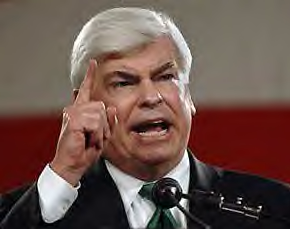[cross-posted at Liberty & Power]
In tonight’s Democratic debate, when asked which should take priority, national security or human rights, Chris Dodd said something like the following: “National security, of course. When the President takes the oath of office, he swears to do two things: to protect the Constitution, and to protect our national security. So clearly national security is number one.” Later on in the debate he repeated the first half of this odd claim, saying something like: “The President doesn’t swear to protect the country or protect the Constitution, he swears to do both.”
 Now even if it were true that the President swears to do both those things, it’s hard to see what would entitle Dodd to conclude that the second one must take precedence over the first. But in fact there’s nothing about national security in the presidential oath of office:
Now even if it were true that the President swears to do both those things, it’s hard to see what would entitle Dodd to conclude that the second one must take precedence over the first. But in fact there’s nothing about national security in the presidential oath of office:
I do solemnly swear that I will faithfully execute the Office of President of the United States, and will to the best of my ability, preserve, protect and defend the Constitution of the United States.
Now perhaps someone might argue that protecting national security is involved in “faithfully execut[ing] the Office of President of the United States.” But in the Constitution’s listing of presidential duties, the only presidential function that has anything to do with national security is serving as “Commander in Chief of the Army and Navy of the United States, and of the Militia of the several States, when called into the actual service of the United States.” And who determines when or whether the army, navy, and/or militia are to be “called into the actual service of the United States”? The Congress. The President is not supposed to be proactive in military policy; he’s supposed to lead the troops against enemies of Congress’s choosing, at a time of Congress’s choosing, for a duration of Congress’s choosing. There’s no way of construing this modest assignment into some sort of sweeping license to suspend constitutional rights in the interest of national security.
So either a) Dodd is lying, or b) he doesn’t know what’s in the oath he’s so desperate to take or the Constitution he’s so eager, or c) he thinks protecting the Constitution just means protecting “it” from foreign invasion and not, say, protecting the rights enumerated in its text.
Now I, obviously, don’t think that protecting the Constitution and protecting human rights amount to the same thing, and I don’t much care about presidential oaths one way or another. Still, it’s clear enough that the function of Dodd’s surreptitiously slipping the presidential oath’s actual requirement (protecting the Constitution) into second place behind its invented requirement (protecting national security) was to downplay the importance of rights, and to lend colour of law – or colour of presidential oath, anyway – to such downplaying. So, for the record: the presidential oath clearly places constitutional rights above national security. If you don’t like those priorities, then for God’s sake stop running for the job that requires you to swear to uphold them.